MAGAZINE OF U.S. MENNONITE BRETHREN







Asreported in this issue, former Pacific District Conference minister Gary Wall’s pastoral credentials and license have been revoked by the PDC and U.S. Conference Boards of Faith and Life. Reflecting on the ways individuals responded since word of Wall’s sexual misconduct surfaced in the fall of 2019, as someone who wants the best for our faith community, I see four lessons.
Dealing with sexual misconduct can cause us to wrestle with tough questions about forgiveness,
reconciliation and restoration.
Resources: Pat Coyle, chair of the PDC restoration team that investigated Wall’s departure, notes that without a plan leaders can lose their way when responding to sexual misconduct. That’s why USMB offers a resource for dealing with clergy sexual misconduct.
The resource can be downloaded at https://usmb.org/pastoral-licensing-documents/ Additionally, experienced and trained individuals in the USMB community can advise and guide. The problem is not that we don’t have resources; it’s that we don’t always use the resources we have.
Bias: I’ve wondered why leaders fail to follow guidelines for responding to sexual misconduct. One reason is that when we know the person accused, it is hard to believe the allegation, and so we don’t respond the way we should. We can’t imagine that a respected leader, friend or colleague would do something like this. When we know someone, it is easy to believe their claim of innocence.
Perspective: The USMB resource on dealing with sexual misconduct outlines a process that involves members of the pastoral staff as well as an investigative team. But because we often believe the best of people we know and work with, it is important to involve an impartial third party to investigate sexual misconduct. Determining the truth should be a priority, and a third party can help accomplish this goal.
A turning point in the response to Wall seems to be the restoration team’s decision to hire Telios Law Firm. Not only did the law firm have access to public records that were not circulated, Telios provided an outside perspective and information that those who know Wall well found convincing.
Effort: Dealing with sexual misconduct takes effort. It involves educating ourselves and our congregations. It means pursuing the truth, which can be time consuming and reveal things we’d rather not know. Dealing with sexual misconduct can cause us to wrestle with tough questions about forgiveness, reconciliation and restoration. It requires a level of honesty and transparency that can be uncomfortable. Knowing that the challenge isn’t if, but when we will face a case of sexual misconduct, let’s be prepared to do the hard work.
Connie Faber, Editor
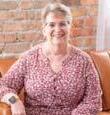
Publisher: United States Conference of Mennonite Brethren Churches/ISSN 0009-5149
Postmaster: Send address changes to Christian Leader, Box 155, Hillsboro, KS 67063. Periodical postage paid at Hillsboro, KS Vol. 85, No. 6 — January/February 2023
Editorial Committee: Matt Ehresman, Michele Fiester, Aaron Garza, Ryan Loewen, Lynn Patterson, Shelly Spencer, Tony Petersen. Review Committee: Don Morris, Jordan Ringhofer, Brent Warkentin
Disclaimer: The content and viewpoints expressed do not necessarily reflect the views, beliefs and/or viewpoints of USMB as a whole.
Copyright: Articles are owned by the Christian Leader or the author and may not be reprinted without permission. Unless noted, Scripture quotations are from the New International Version.
Subscriptions: $10 for six issues and $20 for 12 issues ($15, $30 in Canada, all other countries $25 for six issues); $2 per copy.
Correspondence: Christian Leader, Box 155, 107 N. Main, Hillsboro, KS 67063-0155. Phone: 620.947.5543. Email: editor@usmb.org
Membership: Evangelical Press Association and Meetinghouse
■ Don Morris, EDITOR-IN-CHIEF
■ Connie Faber, EDITOR
■ Janae Rempel, ASSOCIATE EDITOR
■ Shelley Plett, GRAPHIC DESIGNER
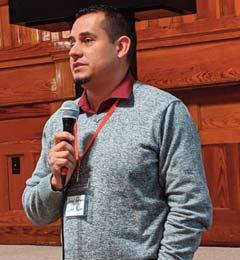

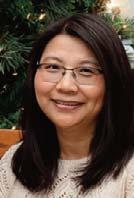




Holding a biblical worldview is becoming rare
“Thingsonce unthinkable are now unquestionable,” writes John Stonestreet, president of the Colson Center, in his foreword for Faithfully Different by Natasha Crain. This quote succinctly and sadly states where we find ourselves as we begin 2023.
Things we wouldn’t have imagined would be accepted or championed are now the norm, and even questioning them is off-limits. Holding a biblical worldview is rare, even among Christians. Arizona Christian University’s annual American Worldview Inventory reveals that in 2021 only 21 percent of those attending evangelical Protestant churches held a biblical worldview. This is shocking to me.
We live in an age where God’s truth and his divine revelation—through his Word—are maligned by those who don’t believe and sometimes modified and marginalized by many who claim to follow him.
In too many churches, we stop with love and acceptance and do not engage people with the powerful truth of the gospel and the absolute need for God’s radical renewal.
As Paul writes in 2 Timothy 4:3, “For the time will come when people will not put up with sound doctrine. Instead, to suit their own desires, they will gather around them a great number of teachers to say what their itching ears want to hear.” We have a lot of itching ears even among us Mennonite Brethren.
We’re being inundated with massive doses of powerful daily influence as to what to believe and think. In short, we’re immersed in secularism. Secularism basically says that social justice trumps God’s Word, if you even believe God’s Word exists. It says that right and wrong is determined by popular consensus not through the revealed Word of God.
We can’t escape secularism’s influence. Not only are the majority totally bereft of influence by God’s moral law, the church is being eroded as well. We see movements in the church that are the result of mixing secular ideas with biblical views. As Natasha Crain writes, “The resulting worldview is often more secular than biblical—a hybrid that’s no longer faithful to the Bible.”
For instance, there is significant influence in American churches for inclusion and acceptance of all manner of sin. Social justice is what matters. Let me be clear: I’m all for loving people who are living in bondage, whether that be financial, marital, sexual, addiction or unbelief. Jesus came to earth for the broken (Luke 19:10). The church must be about reaching the lost, loving and helping those who are apart from God.
But I’m not for accepting these things without acknowledging the necessity of becoming new creations in Christ. I find many instances in the Gospels where Jesus confronts the sin in people’s lives as he engages them. He mixes immense love with an immense expectation of repentance and transformation. In too many churches, we stop with love and acceptance and do not engage people with the powerful truth of the gospel and the absolute need for God’s radical renewal. The authority of “self” has become what dictates— rather than the authority of God Almighty.
What does this mean for Mennonite Brethren? Where are we headed? What are we compromising? I’ll write more in the future, but I plead to all Jesus-followers. Let’s follow all of God’s truth not just what we find appealing or comfortable.
Don Morris don@usmb.org

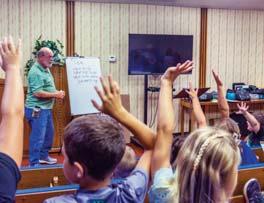

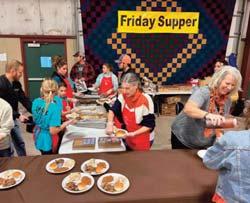
Fairview, Oklahoma • Established 1895 Southern District Conference • Attendance: 250 Pastor Travis Schmidt
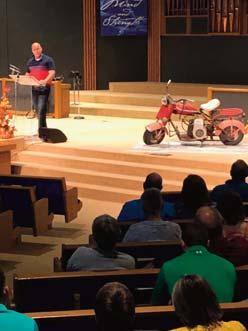
Our congregation in three words: Generous, Heritage, Involved How can you pray for us?
Pray for a spirit of unity. We’ve made difficult decisions over the past months that have caused friction with a few. Pray also for our youth pastor search. We’ve been at it for a year and a half now!
Connect with us! facebook.com/MBChurchFairview
Top left: FMBC runs a bus service to pick up children for Wednesday evening youth programming, which begins with a fellowship meal, followed by activities. Elementary age children participate in the AWANA program (pictured), while junior high and high school students each have their own activities.
Top right: The congregation helps make and serve the Friday evening meal, typically pulled pork, at the Oklahoma Mennonite Relief Sale. Pictured is the junior high youth and other volunteers serving the meal.
Left: Pastor Travis Schmidt speaks during Biker Sunday, an annual fellowship and outreach event that includes a meal, a prayer of blessing and a ride designed to bring together riders from multiple churches and introduce others to church.
Compiled by Janae Rempel
When the USMB Leadership Council met Oct. 7-8, 2022, in Denver, Colo., members approved a new USMB staff position.
At the recommendation of the National Strategy Team, the Leadership Board approved the creation of a parttime position for an integrated immigrant coordinator and appointed Henri Ngolo to fill that position. Ngolo will specifically serve Congolese churches that are members of USMB or are interested in affiliating with USMB.
In other decisions, David Zarate, from La Grulla, Texas, was affirmed as the USMB representative to Mennonite Disaster Service.
USMB has hired Henri Ngolo as integrated immigrant coordinator for Congolese churches in the United States.
An entrepreneur and bivocational minister, Ngolo brings 26 years of management experience to the role. He works as marketing director with Costco Wholesale in Dayton, Ohio, a position he will continue to hold.
“Henri is zealous in his desire to serve Congolese pastors and churches,” says USMB national director Don Morris. “He understands the specific needs and speaks several of the Congolese dialects.”
Ngolo earned his master’s degree in Christian Entrepreneurship and Innovation from Tabor College in Hillsboro, Kan., in 2022. He holds a master’s degree in missiology from the University Center in the Democratic Republic of the CongoKinshasa and an associate degree in business management from Cuyahoga Community College in Cleveland, Ohio.
The board approved the 2023 budget of $1,029,500, which compares to $1,004,500 for 2022. Church receipts for 2023 are budgeted at $380,000 and staff fundraising is projected to net $207,000. Income from other sources, including $180,000 from MB Foundation, makes up the remainder.
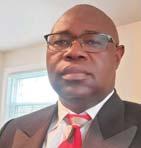
Ngolo will connect with Congolese pastors who serve USMB churches and those interested in pursuing USMB affiliation. He will assist church leaders in securing places of worship, obtaining national and state government financial requirements and facilitating further education.
Ngolo will collaborate with district ministers and will report to Morris. He began his new role Nov. 1, 2022.
Ngolo and his wife, Bienvenue, have been married five years and have three children. They attend Christian Center the Hand of God in Hamilton, Ohio.—USMB
A new lineup of LEAD Cohorts is coming in February. New topics include managing leadership anxiety and ways the Lord’s Prayer serves as a model for prayer and a map for life. Back by popular demand is a cohort for children’s ministry leaders. Other topics include contemplative conversations, cohorts for pastors’ wives, youth ministry and more.
LEAD Cohorts are free online meeting places for anyone interested in learning more about a specific topic. The only cost is for books or materials as recommended by the cohort leader. Cohorts typically meet online via Zoom for about an hour every two weeks over a threemonth span.
Updated cohort information and links to sign up are available at http://www.usmb.org/lead-cohorts/.—USMB
The council discussed several other agenda items, including the invitation from MennoMedia to be part of a project celebrating the 500th anniversary of Anabaptism and the reversion clause as it appears in the national conference bylaws. The council also heard reports from ministry representatives.—CL | Read longer versions of these and other articles at christianleadermag.com |
Donations to USMB on Giving Tuesday, Nov. 29, 2022, totaled $10,450.
Donations will help fund USMB’s three core commitments: leadership development, including the new Leadership Pipeline; church multiplication and evangelism and the new Church Planting Council; and disciplemaking through a varied lineup of
Former Pacific District Conference minister Gary Wall’s ordination and credentials have been revoked by the PDC and the U.S. Conference of MB Churches. The decision was announced Nov. 29, during a meeting for interested members of the PDC.
Wall was charged in 2019 with engaging in prostitution in Fresno, Calif., while he was the PDC minister. He withdrew a plea of no contest in 2020, and the case was dismissed based on a plea agreement. He has maintained his innocence and in 2021, expressed his desire to be restored. A restoration team was formed, but Wall withdrew from the process after a third-party law firm was engaged to investigate.
Based on the firm’s final report, the restoration team recommended that Wall’s ordination and credential be rescinded and that his ministry status be updated to indicate he is “not suited to serve in a district, national or international role in the Mennonite Brethren denomination unless and until he chooses to re-engage in a satisfactory reconciliation process with denominational leadership.” —CL
LEAD initiatives.
“Giving Tuesday provides a way for us to raise a portion of muchneeded funds for resourcing just some of the many things USMB provides for our USMB family of churches,” says USMB national director Don Morris. “For those who donated to USMB on Giving Tuesday, I want to express my utmost
thanks. You made a difference.”
Giving Tuesday is a global day dedicated to generosity that falls on the first Tuesday after Thanksgiving. In the nine years USMB has been part of Giving Tuesday, donors have contributed $243,293. Visit www.usmb.org/givingtuesday to learn more.—USMB
The 112th Central District Conference convention was held Nov. 3-5 at Redemption Church in Owatonna, Minn.
Speakers included Jon Annin, lead pastor of Stony Brook Church, Omaha, Neb.; Christian Kohs, lead pastor of the host church, and Aaron Garza, lead pastor at Bethesda Church in Huron, S.D.
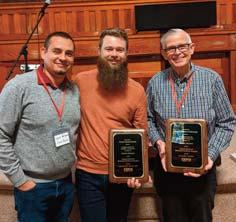
Rick Eshbaugh and Dan Strutz were presented with plaques recognizing their service as district ministers. Eshbaugh served as the CDC minister for almost 10 years, resigning in May 2022. Strutz served from September 2019 to November 2022 as a part-time district minister.
Daniel Rodriguez was officially introduced as the new CDC minister. Rhonda Swiers, Callaway, Minn., will serve as administrative assistant. Friday evening delegates heard testimonies from three members of Redemption, as well as church planters Jon and Michele Fiester from Renewal MB Church in Rapid City, S.D., and Apostle Claude Tambatamba from New Jerusalem Temple in Sioux Falls, S.D. The Renewal congregation will host the 2023 CDC convention.
During business sessions, delegates voted to approve a 2022-23 budget of $419,400, down from actual expenses of $564,796 the previous fiscal year. Delegates also elected new committee members and heard reports.—CL
MB Foundation is matching funds to support one Congolese congregation in the CORD Program. At a total cost of $55,500 per church, MB Foundation is committed to matching the next $27,750 donated.
Through CORD, USMB hopes to provide $55,500 over three years to three vetted Congolese congregations, including $12,000 per year for rent, $500 per year for biblical training and a $6,000 per year stipend to allow lead pastors to devote more time to training and congregational development.
Learn more or donate at www.usmb.org/cord-program.—USMB
More than 300 students and adult leaders and organizers gathered in Hillsboro, Kan., for the Southern District Youth Conference (SDYC) at Tabor College, Nov. 18-20. Dustin Galyon, Hesston (Kan.) MB Church, served as guest speaker. Presence Worship led music. The event included sessions, workshops, free time, worship and latenight activities. The three MB churches in Hillsboro provided host homes and organized activities.
The Central District Fall Youth Conference was held at Camp Rivercrest in Fremont, Neb., Nov. 17-20. The event included five sessions, games and worship. Randy Washington served as speaker. A team from Tabor College in Hillsboro, Kan., led music. Friday, youth completed service projects in Omaha, Neb.—CL
Two North American agencies were involved in December fundraising efforts to provide heat and basic supplies after Russian air strikes on Ukraine’s energy grid in late November left millions with no light, water or heat. In partnership with relief organizations, Mennonite Brethren churches provided people with clothing, stoves, firewood, generators, flashlights, batteries and basic food supplies.
Donations made to MB Foundation and designated for stoves were earmarked for 100 wood stoves at a total cost of $25,000.
Donations to Multiply aided in the distribution of 3,500 30-pound bags of food, 20 generators and 50 stoves by the end of December. Multiply plans to build and distribute another 150 stoves by the end of January. —CL
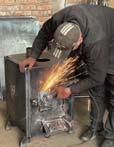
The May 2022 issue of Prairie Tracks Magazine features Gayle Stahl of Bethel Church, Yale, S.D., sitting on the steps of a 1920s bungalow. Inside this regional chamber of commerce magazine is the story of Hope House, the fulfillment of Stahl’s dream of a sober living home in Huron for women in recovery from addiction. Hope House, which opened last March, is a safe and supportive home for women to live and stay sober as they address addictions through their recovery programs.
Where did the idea for a sober living home in Huron come from?
It happened around a table in the Beadle County Jail doing a Celebrate Recovery Bible study. All four women in the group were addicted to meth, and I naively asked, “What happens when they let you out of here?” Hearing their answers, God put it on my heart that they need a place to get clean.
How did you come to see this was a calling for you?
I spent a good six months telling God it wasn’t me. Celebrate Recovery’s 12-step program had been a major player in my own recovery from depression, but I didn’t know anything about drug and alcohol addiction. The last step in the 12-step program is “give back” and God was saying, “It is you.”
How have you seen God provide?
This project has been one of the biggest blessings of my life. It’s been such a grass roots effort with support from Bethel Church and many other community members. One day at my 6 a.m. waterwalking group, I told a woman about
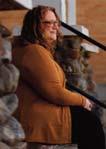
looking for loans to try to buy a house. She said “I think I know of a house for you.” By 4 p.m. that day we had a house. Forty-plus people from local churches and the community came out to clean it up. A contractor who was in recovery himself worked on it for several months to make it livable.
Why do you believe Hope House will make a difference?
This is clearly God’s project. I could never have done it. But also, of the four women in that Beadle County jail, only one is sober today. Research has shown that a person who lives in a sober living environment for nine months to one year has an 80 percent chance of staying sober for at least 10 years.
What is your hope for the women?
The majority of the women we work with don’t know the unconditional love of God. As they arrive we welcome them home with a gift bag that includes a Bible. I don’t pretend to know what they’re going through, but I tell them my story of recovery and what God has done for me. I want each one to feel loved and know she is worthy of recovery.
Interview by Kathy Heinrichs Wiest
COVID-19 has had far-reaching effects on the ministries of Japan’s 28 Mennonite Brethren churches, says Takao Sugi, president of the Japanese MB Conference, in a December email to the CL. Each time over the past three years when the government issued states of emergency and other restrictions, most Christian churches canceled Sunday services and other activities.

Even though most churches have resumed in-person meetings—with some restrictions in place—restoring previous habits has not been easy.
“It hasn’t been easy to get back to the former way of doing things,” Sugi says. “Gathering at church for Sunday services was a priority for Christians. In a pagan society like Japan, going to church is often done at great cost. Still, faithful Christians cherished doing so.
“Most Christians are eager to return (to in-person gatherings), but some seem satisfied with remote worship and meetings. It is certainly convenient, but it’s not comparable to face-toface fellowship.”
Sugi continues, “Even now, some churches refrain from singing praises out loud. Some churches have not yet held the Lord’s Supper and have increased the number of worship services to two or three to avoid crowding.”
As a result of the restrictions on church activities, churches’ financial
• Japan consists of 6,852 islands, of which only 400 are permanently inhabited.
Local MB church community outreach initiatives include street ministry and teaching English as a second language.

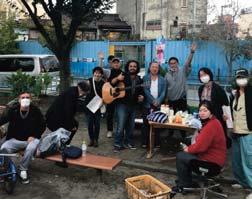
situations have been deeply impacted. More than 70 percent of the Japanese MB churches are finding it difficult to support their pastors. The seminary is also in a difficult situation. There were no students enrolled in 2022, and as of December 2022 there are no applicants for admission in 2023. Half of the current pastors will reach retirement age in the next 10 years. New leaders to lead the next generation are needed.
PRAYER REQUESTS:
• Pray that people desiring to be full-time ministers will enroll in the seminary.
• It is difficult for many churches to fully support their pastors financially, so some pastors serve in two or more churches. Pray for financial provision.
• There is a growing tendency in Japan to dislike religion. Pray for God’s moving among the Japanese people.
• Japan has the highest density of vending machines in the world — one for every 24 people.
• Japanese bow when they meet, express thanks or say goodbye.
What do we hold on to when it seems like everything is changing?
Over the last couple of years, I’ve grown increasingly weary of the term “unprecedented times.” Although there’s plenty to support the validity of the phrase in many aspects of our public and private lives, perhaps a more accurate phrase might now be something more along the lines of “disorienting” or “surreal.” So many of us are encountering ideas and engaging in conversations that we might have otherwise never even dreamt of. Church leaders, pastors and church communities are continuing to deal with the ramifications of a world turned upside down and twisted inside out.
On top of this, we’re living in a world where people are becoming less and less sure of what they can be confident. In 2016, Oxford Dictionary selected “posttruth” as its word of the year, defining it as “relating to or denoting circumstances in which objective facts are less influential in shaping public opinion than appeals to emotion and personal belief” (emphasis mine). There is much to be uncertain of, with increased access to digital information, fewer reliable sources of objective truth and addiction to digital devices and social media across nearly all generations.
This is complicated by rapid global change and transition. In his latest book, A Non-Anxious Presence, Australian pastor Mark Sayers describes our current day and age as a “grey zone,” a time of transition between two eras. A grey zone contains the influence of both the passing and forming eras and is therefore “confusing and contradictory, filled with change and conflict. Everything seems to be up in the air.”
Disorienting…surreal…uncertain. As uncomfortable as they sound, these words are becoming increasingly normative for so many. As followers of Jesus, what will ground us? When it seems like everything we can sense is undergoing change in our
world, the Scriptures tell us in Malachi 3:6 that “I the Lord do not change.” The great pastor and preacher Charles Spurgeon adds, “It is well for us that, amidst all the variableness of life, there is One whom change cannot affect.”
Yes, Scripture describes God as unchanging, which many theologians call the immutability of God. Why does this matter? Sometimes there is beautiful change like the growth of a family, purchase of a first home or the accomplishment of a major milestone like earning a doctorate.
This is a topic that deserves much more attention than what can be unpacked in a single article. There are chapters of systematic theology textbooks as well as entire volumes dedicated to the theme of God’s immutability. I find Wayne Grudem’s Systematic Theology definition helpful, which says that “God is unchanging in his being, perfections, purposes and promises, yet God does act and feel emotions, and he acts and feels differently in response to different situations.”
God is sufficient in his being and perfections. What could be added to God to make him better? He is already perfection. And should anything be taken away he would cease to be God. Likewise, God has no beginning and no end. Psalm 102:25-27 proclaims that “In the beginning you laid the foundations of the earth, and the heavens are the work of your hands. They will perish, but you remain…you remain the same, and your years will never end.”
Additionally, God does not change in terms of his plans or purposes, where according to Psalm 33:11, “But the plans of the Lord stand firm forever, the purposes of his heart through all generations.” In Numbers 23:19, God’s nature is contrasted with human nature through the prophetic words of Balaam: “God is not human, that he should lie, not a human being,

By Clayton Paull
So, Scripture affirms the beautiful truth that God is constant and unchanging, which Millard J. Erickson, in his book Christian Theology, says excellently, “The biblical view is not that God is static but stable. He is active and dynamic, but in a way that is stable and consistent with his nature.”
God is trustworthy and stable because he is the same yesterday, today and forever. James reminds us that “every good and perfect gift is from above, coming down from the Father of the heavenly lights, who does not change like shifting shadows” (James 1:17). What joy that the greatest gift is the perfect and eternal Jesus, who invites us to bring our questions, our concerns, our uncertainties before the throne of God with confidence.
It also brings to mind the wonderful hymn, Great Is Thy Faithfulness. The lyrics draw heavily
Disorienting…surreal…uncertain. As uncomfortable as they sound, these words are becoming increasingly normative for so many.
that he should change his mind. Does he speak and then not act? Does he promise and not fulfill?”
Now I tend to think that in our humanity, the second half of Grudem’s definition, where “God acts and feels differently in response to different situations” can sometimes cause us to question this attribute of God. But is it possible that in our flesh we’re perceiving that God is changing his mind, when in reality we’re only seeing part of the picture?
Last summer, our church community was journeying through Jonah. As we got to the “impending doom” of Nineveh in chapter 3, God’s word to Nineveh seemed pretty clear: “Forty more days and Nineveh will be overthrown” (Jonah 3:4).
But here’s the thing. The word overthrown is the Hebrew word h¯a¯pak which literally means “to turn.” The implications of this word could result in destruction or forgiveness, depending on the Ninevites’ response. As the story continues to play out, we see God’s deep and profound compassion expressed (another central attribute of God), without negating his immutability.
from the truths of Lamentations 3:22-23, which says, “Because of the Lord’s great love we are not consumed, for his compassions never fail. They are new every morning; great is your faithfulness.”
There will surely be more confusion, more conflict. But even in our disorientation, we can trust and look upon the God who did (and still does) respond with grace and mercy. In a world that is continually transformed and changed, where uncertainty seems to be the only constant, there is hope because God is stable. God is constant. God does not change.
This is hope—that God may be the unchanging and eternal rock on which we can confidently stand and declare:
“Great is thy faithfulness!
Morning by morning new mercies I see; All I have needed thy hand hath provided Great is thy faithfulness, Lord, unto me.”
Clayton Paull has been the lead pastor at Hope Kingsburg in Kingsburg, Calif., since 2021. He is a graduate of Multnomah Seminary, Portland, Ore. He and his wife, Kim, have two daughters.

By Chandelle Claassen


Change is often perceived as negative and oh. so. hard! What once was, now looks different. Routines have shifted or the people around us have left and our circle— our sphere of influence—looks different. The list goes on. Constant change is the one constant in life on earth. All aspects of life are continuously shifting because we are embodied souls in aging bodies. Therefore, we must learn to welcome change to find the possibilities that lie within.
I’m intrigued with change and the hinge-ness of it. The hinge is a moveable joint, the mechanism on a structure that allows movement from what was to what will be. The hinge is that middle movement piece that allows us to close one door or gate and enter another room, pasture, chapter, season, etc.
Too often we rush to the next thing. Too often we hold too tightly to the last thing. What happens if we learn to be present in the middle space? What happens if we allow ourselves to hold a holy curiosity to the hinges in our lives where change is taking place?
Our holy hinges are those liminal spaces where a forced pause is upon us. We receive the grace of God to pause, to name what we are feeling, to honor what was and perhaps, often, to grieve. But to also dream, anticipate and desire. Mostly though, our holy hinges allow time to rest, draw near to our Savior and be in the presence of the Trinity.
Change can be dramatic, as seen in the caterpillar’s transformation to the butterfly. The hinge in this visual is the cocoon—that space of letting go of what was, to reaching for what will be, to surrendering to the rest in God’s protective care and provisions as we go through a change season. It’s hard work, no denying that. Change can be a lonely experience.
Deep wonderment or a holy curiosity allows for a grace-filled space to open in our lives during seasons of change. One that will allow us to be increasingly more present to ourselves, to God, to others around us.
My invitation is to be filled with wondering as we practice the presence of God. Use our Godgiven imaginations to picture Jesus with us at the table, in the car, standing alongside us in our lives. Jesus with us in our pain and grieving. Jesus with us in our celebrating and delighting. Jesus with us in our pauses. Jesus with us in our rest. Jesus with us in our changes.
Further, there is an invitation to use our imagination to place ourselves in the Gospel stories. To have wonder at Jesus’ life and connect deeply to the Spirit as we enter into Jesus’ journey. Look for how Jesus handles change. Where does Jesus practice letting go? Where does Jesus embrace what is ahead in life? Where does Jesus rest in the sacred pauses of change?
Sometimes, and quite often at that, different areas of change happen all at once. Change seasons can be dramatic, traumatic, ecstatic, iconic. Deeper awareness allows us to see we can’t separate out the event of change from the change happening within us through change itself. Change is a both/and event and should be seen as such if we are really going to thrive in the shift and grow forward.
Through my own life experiences, I’ve named lots of changes and I’m realizing I will continue to do so for the rest of my life. Why aren’t we taught that in school? So we do need to talk about change and how to navigate that shift from what was to what is and the pause or hinge-space in the middle. And to really have a curious wonder to discovery of God’s presence in all of it.
Cancer patients are often told they are brave. People going through adversity and changes are told they are brave or to stay strong. That was a distinct and interesting season of my cancer story. I was hesitant and resistant to it. I had no choice but to be present to myself and to give my body over to medical treatment. I felt like to be brave, I had to make a choice to be brave. Over time I’ve come to understand that simply showing up is a brave act. Taking one breath or step at a time is a brave act when facing change.
These days I have a holy wonderment and curiosity about the word resilient. The American Psychological Association describes being resilient as, “the process and outcome of successfully adapting to difficult or challenging life experiences, especially through mental, emotional, and behavioral flexibility and adjustment to external and internal demands.” The words adapting and flexibility shimmer for me in that definition. How might we find our inner adaptability and flexibility in our change seasons? Finding our ability to bounce back and resume life rhythms?
Likewise, a couple of years ago I started hearing the phrase post-traumatic growth, and once again, a holy wonderment caught my attention. Post-traumatic growth refers to a theory of transformation following trauma in which people not only bounce back but have a renewed sense of identity and understanding of who they are, how they interact with others and appreciation for a life well lived. Sounds like what God is all about, doesn’t it?
Scripture is filled with verses on change, transformation, renewal, rebirth and repairing ruptures. Some of my favorite passages of Scripture are found between Jesus’ resurrection and ascension. The transformation that we witness in these stories speak of deep healing and growth in seasons of drastic and overwhelming change.
I’m often amazed at what God allows for humankind to discover. When passages like Romans 12:2, “Do not conform to the pattern of this world but be transformed by the renewing of your mind. Then you will be able to test and approve what God’s will is—his good, pleasing and perfect will,” and Mark 12:30, “Love the Lord your God with all your heart and with all your soul and with all your mind and with all your strength,” were penned in Scripture, I imagine God anticipating when our discoveries would catch up to what God has already written and created.
What we are learning regarding neuroscience speaks to the renewal of our minds. Neuroplasticity refers to our brain’s adaptability and ability to reorganize our neural networks, and these structural changes allow for growth and healing restructuring. Nothing is completely lost and stagnant. There is hope in the middle of change that allows us to be resilient and to grow.

Therefore, change will continue to be oh. so. difficult at times. And at other times, it will be exhilarating. Regardless, something is shifting in life. What once was, is gone. What will be, is yet to unfold. And what is can be seen as a beautiful sacred hinge space of discovering who we are in our change seasons.
Chandelle Claassen is a trained spiritual director, certified professional life coach and a certified coach with USMB LEAD coaching. Claassen is a frequent USMB LEAD cohort facilitator. She and her husband, Russ, who is the Southern District Conference youth minister, have two sons. They attend Koerner Heights Church, Newton, Kan.
I needed joy down in my heart
By Aaron Halvorsen


year ago, we knew we needed joy. Now we know only God produces it.
As 2021 ended, my wife and I were convinced of our need for joy. It was not a New Year’s resolution but a conviction of something unsettled in our spirits. The fatigue and discouragement that accompanied the pandemic years had fostered a lack of joyfulness in our home.
I don’t think we were alone. Pastoral ministry provides insight into the emotional and spiritual state of others, and I know a general discouragement has plagued many saints. My church, I believed, needed joy as well. Beyond that, they needed a joyful pastor. Grumpiness, no matter how well-hidden, does not lead to fruitful service. And I don’t recall grouchy being listed as a fruit of the Spirit. I was convicted of the need to model joyfulness.
Our non-pursuit of joy
So, my wife and I prayed for joy. We made a commitment that in 2022 we would pursue joyfulness. We asked a few others to pray as well. We then proceeded to do nothing to intentionally cultivate joy. We did not hang joyful slogans on our walls. We did not sing hymns about joy. We did not read any of John Piper’s many books elaborating on the theme of joy. We did not memorize or study Zephaniah 3:14-17, which contains eight different Hebrew words related to joy and rejoicing. Shamefully, we mostly neglected our commitment to joy.
Yet, I believe we are more joyful now than we were 12 months ago. The pressing question, then, is not “How did we do that?” but “How did that happen?” Because we essentially did nothing.
Insofar as we have truly grown, it is not due to anything we did, but only because of what God did. The impetus to any legitimate change has not been our dedicated effort but his sanctifying work. His grace alone has grown us.
Our efforts were dedicated to getting by and hanging on, in large part due to another failed pregnancy. After being greatly blessed with four healthy children, we experienced three successive miscarriages; the third falling in the summer of 2022.
The first miscarriage was difficult. But it happened early in the pregnancy, and we had already beaten the odds with four healthy deliveries. The second miscarriage hit harder and was a greater immediate shock. The sorrow of the third miscarriage, however, has endured in a unique way. Naturally, the culminating losses made the last the most difficult. Our third was also the furthest along, at nearly 14 weeks.
We were able to hold our 14-week-in-utero son, whom we named Job. (“The Lord gave and the Lord has taken away, blessed be the name of the Lord,” Job 1:21 (ESV). That experience marked us. It was a day of profound sadness and nearness to the Lord and each other.
In a strange way, I am thankful for the singular experience of holding a human at that early stage of development. It galvanized my already firm convictions (better yet, knowledge) of when life begins. More importantly, it brought healthy closure and instilled anticipation of the resurrection. That day seems ages ago, and yet as I write this, Job’s original due date is still ahead (late December). We will remember and grieve again, then happily look to our eternal reunion.
Job’s death triggered a series of medical tests. Three failed pregnancies established a trend. Bloodwork and additional testing were needed to determine a potential cause, such as an autoimmune disease in my wife. No such condition has been found, for which we give sincere thanks. Very practically, however, these tests drained us of time, money, energy and emotion.
God’s grace and a good church—and the ongoing delights and challenges of life, family and ministry—carried us. We did not take time to actively develop a sense of joy. Our energies were devoted to faithfully and imperfectly living and serving. In the background, God was doing the work of producing joyful hearts.
The Lord used our experience to instruct us in biblical joy. The first lesson lies in its definition. In God’s economy, joy is not tied to circumstances. I have heard it said that joy runs deeper than pain or pleasure. It is a happiness that is not tied to
“In the background, God was doing the work of producing joyful hearts.”
fortune or favor. It is an orientation of the heart that can thrive even in difficulty.
If joy is not bound to circumstance, then what is its foundation? Jesus has our answer. He once commissioned 72 disciples to heal and to preach the gospel of the kingdom’s arrival. They returned with joy. The cause? Their great success! The mission could not have gone better. Even demons were subject to them. We can assume they had never experienced such spiritual victory.
Surely this was a cause of rejoicing! How many of us pastors, missionaries and ministers think the same? We place our joy on the fickle foundation of ministerial success. Is the Lord “blessing” our work with great apparent fruit? Rejoice! Are our ministry efforts frustrating and seemingly ineffective? Despair! Like the 72, our hearts are too easily yoked to the wild swings of success and failure.
Jesus establishes a surer foundation in Luke 10:20, “Nevertheless, do not rejoice in this, that the spirits submit to you, but rejoice that your names are written in heaven.” Here is joy secured. Not in ministerial (or familial or financial) success but in the certainty of our eternal union with our Father in heaven.
Joy is found in the Lord and his salvation. This never changes, never ends, never fades, never fails. It endures in every season, because the seasons have no bearing on our standing with the Lord if we are truly in him. Psalm 16:11 says the same: “in your presence there is fullness of joy.” Joy isn’t found in the circumstances of life, but in union with God in Christ.
Like this salvation, joy is a gift given. This has been our second lesson on joy. It is a fruit of the Spirit, not a product of our will. Our wills had no great ability to produce joy. If we were to have it, God needed to give it. We couldn’t grow it.
Surely, there is an element of effort in Christian growth. We are called to “work out” our salvation with fear and trembling. Effort is involved. Ultimately, however, we are not only justified but also sanctified by grace. In our spiritual growth, “Did we in our own strength confide, our striving would be losing” (A Mighty Fortress is our God ).
The Lord worked joy in us. Not by our effort, but by God’s grace. And not despite our difficulty but through it. Our trials and pains are how he produced joy because these are the very things that brought us to him (Romans 5:3-4). Joy is found in dependence on, trust in and union with Jesus Christ.
Our trials and challenges have been the tools God used to bind us to him and therein cultivate joy. We would not have chosen this. His wisdom exceeds ours.
We prayed for it, God provided it. We rejoice in his holy name.
Aaron Halvorsen has been the lead pastor at Community Bible Church, Olathe, Kan., since 2015. Halvorsen currently serves on the Multiply Board of Directors. He and his wife, Maggie, have four children.


“Our trials and challenges have been the tools God used to bind us to him and therein cultivate joy. We would not have chosen this. His wisdom exceeds ours.”
Mypeople are the Mizos, a tribe living in northeastern India. In the late 1800s, we lived in spiritual darkness, our daily existence marked by the superstitious fear of offending animistic spirits, whom we sought to appease through ritual and sacrifice. From an early age, our young men learned to protect the village from wild beasts and to defend our borders from other tribal groups. Great celebrations honored warriors who returned to the village with trophies—usually the heads of menacing animals or human enemies. Taking a human head provided the greatest honor a young warrior could hope to achieve.
The British Empire, eager to expand its tea plantations, knew little of these tribal borders. One British subject, Captain Winchester of the East India Company, extended his tea gardens too close to the Mizoram border. Young Mizo warriors descended on his plantation in the dead of night, killing Winchester and kidnapping his daughter. Soon the British army moved in to forcibly subjugate the intolerant tribe. But when Christians in
Britain and Wales learned of the calamity, they were stirred with compassion.
On the heels of the army, they sent missionaries who patiently learned the language, translated the Bible and brought the gospel to this dark corner of the world. The Spirit of God poured over the region, and a spiritual awakening among the tribesmen spread like wildfire. Within a few short decades, most Mizo people converted to Christianity. To this day, church youth choirs sing Handel’s “Hallelujah Chorus” with gratefulness.
Faith in Christ defined my people. Even today it is common for our Christian identity to be built into our given names. For example, my name is Vanlalhmachhuani, which means “the King of Heaven [Vanlal] is my confidence [hmachhuan].” The word hmachhuan is a complex term, meaning something like shield, pride or protector. But it also carries the idea of accomplishing something that I cannot do on my own. Philippians 4:13 beautifully captures the meaning when it says, “I can do all things through Christ who strengthens me.” That is hmachhuan.
My parents delighted us with stories of missionaries around the world. My grandfather was one of the first native missionaries. As a little girl, I dreamed of pouring out my life for Christ. My parents sent me to an English school (versus native speaking schools) with hopes that learning English would further my reach with spreading the Gospel. I resolved to attend Bible
school, and the Lord opened an opportunity to come to America— all in preparation to share Christ. I sensed God’s presence with me, providing the strength and resources I needed.
Yet life has a way of sidetracking and distracting. I muddled through the culture shock of living in a Western materialistic culture. I married and started a family. Feeling the inferiority of living in a foreign land, I held back and just tried to blend in. I learned Americans don’t like to be made uncomfortable, so I began to believe that
See Testimony, page 30
But God’s fire never dies. It simply smolders until the Spirit fans the flame into a blaze.

Vanlalhmachhuani (Amy) Gelatt and her husband, Josh, are the lead pastoral couple at North Oak Community Church in Hays, Kan.
“Thisis a really busy week for me, but next week should be better.” I’ve been saying this almost every week for years, and “next week” is rarely better. I live in San Jose, Calif., the heart of Silicon Valley where being busy is a badge of honor and “hustle” and “grind” are core values. People often complain about how busy they are yet deep-down hope others will be impressed.
But what if we are busy for the wrong reasons? What if we find success at the expense of our families? What if our schedules are full but not with the right things? What if we are impressing others but not Jesus? We may want to glorify Jesus with our schedules but are we trying to make sure a little bit of that glory comes our way too?
Our culture idolizes productivity and busyness, but we aren’t called to follow the pattern of this world (Romans 12:2). Scripture points us to a polar opposite posture: one of abiding.
Abiding in Jesus might prevent us from checking things off our to-do lists. Yet, for those of us aiming to serve the Lord, the results we seek are ultimately found through the power of Jesus, not by how hard we hustle. So then isn’t abiding in Jesus one of the most practical and effective things we can do?
In our busy lives, we may at times find an ugly truth present:
we may not trust Jesus enough to slow down and abide in him. Because we think there is so much to do, we do not slow down to be present with him. We may find that we are trusting in our own understanding instead of God’s (Proverbs 3:5-6). Being still and knowing that he is God (Psalm 46:10) is difficult to put into our schedules.
What can abiding in Jesus look like in the midst of our busyness? Sometimes the answer is to stop everything to simply be alone with Jesus. When I think I’m too busy for that, I remember that Jesus often took time to be alone with his heavenly Father. I ask myself, “If Jesus regularly made space for that, how much more do I need to?”
When it seems like there aren’t enough hours in the day, abiding can be found by reading the Bible while eating breakfast or during family devotions at dinner time. It might be praying while completing a task at work. It could be listening to worship music, a sermon or a Christian podcast while driving. Abiding is faithfully seeking Jesus in every part of our lives: the big events and the everyday moments.
Abiding in Jesus won’t magically answer emails, create the worship slides or any of the other things that are on my plate for ministry. Abiding in Jesus may not change how much we get done, but it may change how people are changed by what you and I do accomplish.
I don’t think Jesus is necessarily against being busy. But in our busyness, he desires that our lives look different than others around us.
Let’s seek prayer over productivity. To rely on Jesus over results. To trust in him over our to-do lists. Jesus desires followers who abide in him no matter how busy their week might be.
“Abiding in Jesus might prevent us from checking things off our to-do lists. Yet, for those of us aiming to serve the Lord, the results we seek are ultimately found through the power of Jesus, not by how hard we hustle.”

mission & ministry ■ USMB updates
Aspart of the strategy for planting new churches across the United States, Church Planting Mobilizer Brian Harris has been working hard at initiating the development of clusters of USMB churches— regional networks—for the purpose of planting more churches. It also means “shoulder tapping” potential new leaders in USMB churches and perhaps partnering with churches in need of renewal for revitalization.
“It’s exciting to see what God is bringing before us as these networks develop,” says USMB national director Don Morris.
In early November, Harris and Morris met with pastors and leaders from the LAMB (Latin American Mennonite Brethren) District Conference in south Texas as they gathered for refreshment, refueling and relaxation on a Friday and Saturday. The group met again Sunday afternoon for a strategy meeting at the new Mission MB Church facility. The meeting was filled with camaraderie and anticipation, looking to the future for church planting—something that has been difficult in recent years for this district.
“The high point of my time with our LAMB brothers and sisters came when we were talking about reaching outside of our church and planting more churches,” says Harris. “Everyone agreed that planting churches is hard work and requires sacrifice. Then Pastor Torres shared a parable about a cat that was ‘disrupting’ the lives of some mice. One mouse had a brilliant idea.
‘What if we put a bell around the cat’s neck? Then we can hear the cat whenever he approaches us.’
The mice all thought it was a great idea! But then one mouse asked the most important question: ‘Who will put the bell on the cat?’
Harris says, “At that moment this pastor said, ‘I will put the bell on the cat!’ Then the other pastors and leaders chimed in and said they too would put the bell on the cat. It was a holy moment.
it’s going to be done as U.S. Mennonite Brethren collectively come together to make it happen.
“Church planting and church renewal won’t happen if we’re all waiting for someone else to do it,” says Morris. “Let’s ‘crew up’ and make this happen!”
Harris, who chairs the CPC, says, “If we’re going to reach more people and plant more churches, we’re going to do that together. The task is too big to try and do it alone. This is the idea
“The USMB vision for church planting across the U.S. is that we all work at this together.”
My LAMB brothers encouraged my heart as they committed themselves to reaching more people through church planting by stepping toward the hard work that will be required.”
The USMB vision for church planting across the U.S. is that we all work at this together. Along with creating regional networks of churches banding together for kingdom work, USMB will work to serve the districts as they strive toward planting new churches. The new Church Planting Council (CPC) realizes that much work is to be done, but that
behind creating networks of churches working together. Currently we have several networks already started and several more in the works.
“I am praying for 10 networks by the end of 2023. Imagine 10 networks focused on working together to start more churches,”
Harris says. “May God allow us, the Mennonite Brethren, to be a family that leads out and sees more churches started and reverse the trend of losing more churches than we’re gaining in the American church.”—USMB
Annual car shows help fuel churches’ traction with community
Carshows can be more than vintage automobiles looking their best, buffed and freshly detailed. Two USMB congregations host car shows so that visitors see and get to know Jesus as church members serve exhibitors, car fans and every onlooker they meet.
Copper Hills Church (CHC) of Peoria, Ariz., and Kingwood Bible Church (KBC) of Salem, Ore., regularly host car shows to connect with and serve their communities.
“The car show brings a lot of people that wouldn’t normally go to church, and that’s what makes it worth it to me—just seeing our neighbors show up,” says Nathan Ensz, lead pastor at KBC. “For most people, church is not on their radar. We want to show the love of Christ to the neighborhood and want our neighbors to know that we genuinely care, and this is one of the ways we can do that.”
KBC welcomed 15 cars, one motorcycle and approximately 200 visitors to its parking lot Sept. 10 for its annual BBQ and car show with activities for all ages including a bounce house, face painting, free burgers and BBQ, a mix of 50s and worship music and awards for “Pastor’s Choice” and “Best in Show” among the cars.
Ensz says the show began approximately 10 years ago as a memorial for church member Marv Lowen, who had a great appreciation for cars. Over the years, the church and Lowen’s widow, Betty, have adapted the car show to be not only a place for people to see cars but also experience church and have meaningful

conversations pointing to Christ’s love.
Ensz says if any visitors experience a hard time in the future, he hopes they will remember the genuine love they experienced from the congregation and come back, knowing they will be welcomed and loved.
Josh Murrel, associate minister at KBC, says he served as one of multiple “floaters” during the event with the intention to talk to and get to know people so that no one left without feeling welcomed and valued as a visitor and as a child of God.
“Good BBQ, friendly people, cool cars—not that necessarily deep, but it gives something for people to unify around and to at least start conversations around,” Murrel says. “What I
loved was making a space for people to come together around a shared interest, even if it was as simple as BBQ food and then be able to build meaningful conversations from there.”
“The tool to our why”
Approximately 200 cars and 800 visitors filled CHC’s parking lot Nov. 12 for its 12th biennial Westwing Classic Car Show with the mission to spark conversations and help neighbors know and experience Christ.
“We want to onboard as many people as we can to have a real relationship with Jesus,” says David Reuss, founder of the car show. “By grouping exhibitors together, talking
to people and serving them where we can, we want to show people Jesus so they can see something different, ask questions, and we hope make the decision to genuinely know and follow him too.”
What began with a handful of volunteers, 50 cars and burgers and hot dogs, has, over the last six years grown to become a church-wide outreach with a full parking lot of cars and a burger and hot dog fundraiser for charities.
“As the show grew, more stories—like of people who said they went to the show and someone at the church helped them, or someone invited them to church so they started to come—did too, which is our whole point,” Reuss says. “We don’t have a car show for a car show, but a car show to get people on campus so we can show people that we look and feel like Jesus so they can slowly understand we’re normal people that treat them differently than any other car show or event.”
Whether purposely placing exhibiting friends together or selecting members of CHC to get to know its show’s exhibitors and visitors, CHC is intentional in its outreach, though Brad Klassen, CHC lead pastor, directs its purpose further.
“It’s more than being intentional, but it’s why we do the event,” Klassen says. “We’re not in it for the classic car show, but that is merely the tool to our why. Our why is we believe we are here in this community to increasingly help people do life with Jesus.”
A car show may not be the best route of outreach for every church, but for churches like KBC and CHC it has been a way to use its space and resources to reach its community.
“Our God is so eager to reach a lost world with hope—so much that he didn’t think it was too much to die,” Klassen says. “When churches keep that in front of them, Jesus is eager to use whatever tools we use to reach people with himself.” —Caitlyn Decker
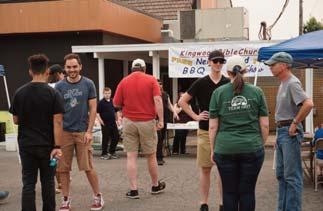






Rodriguez eager to help as new district minister
Forseven years, the Central District Conference (CDC) supported Daniel Rodriguez, a bi-vocational pastor serving the Hispanic congregation Iglesia Agua Viva (IAV) in Omaha, Neb., as he obtained his bachelor’s and master’s degrees.
Now, as the newly appointed CDC minister, Rodriguez has a chance to give back. His own training drives a passion for leadership development as he seeks to serve district pastors.
“I really wanted to use my training in a God-honoring way,” Rodriguez says. “He opened so many doors for me to get training, so I wanted to do something that was related to ministry. The Central District supported me all of those years, so maybe this is God opening that door for us to (give) back in a way.”
Rodriguez did not intend to stay in the United States when he came on a visa to attend high school in Omaha at his aunt’s invitation. He wanted to learn English to secure a higher-paying job and attend college in his hometown of Ciuadad Juárez, Mexico.
As a child, Rodriguez had watched his parents and older brother actively serve at church, so naturally Rodriguez plugged into a church in Omaha, IAV, where he led the youth and joined the worship team.
During that time, he felt a call to preach. He also met a girl.
“The reason that I stayed (in the U.S.) was God’s calling, first of all, and then the idea that I was going to marry this beautiful girl,” he says.
He and Wendy married, and Rodriguez applied for and received U.S. citizenship. The couple has two
Daniel Rodriguez was officially introduced as the Central District Conference minister at the fall 2022 CDC convention. Photo by CL
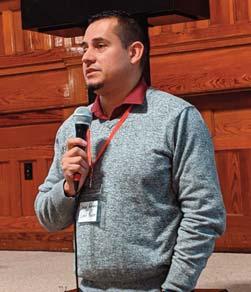
children. Three years into their marriage, Rodriguez became IAV’s lead pastor, a position he held for 12 years.
Rodriguez was in his early 20s when he became pastor, having taken theology classes but never attending a formal institution. With IAV unable to support him full-time, Rodriguez started a carpet-cleaning and car-detailing business.
Former district minister Rick Eshbaugh observed Rodriguez’s passion for learning and offered support.
“Daniel has always impressed me as someone who is hungry for learning and eager to teach,” Eshbaugh
says. “Early on when (IAV) asked him to be their pastor, he made a commitment to train his elders (and) leaders to be partners in ministry. He followed through with this commitment by leading them through a multi-month training program. At one point he asked me if there would be a way for him to receive more training as a pastor and leader. He wanted to provide more for his church. … He didn’t do it just to receive a diploma, but to prepare him for additional ministry and leadership.”
The CDC paid for Rodriguez’s tuition and the equivalent of his parttime salary. He also received a scholarship through MB Foundation’s
LEADGen fund. He earned his bachelor’s degree in ministry leadership from Moody Bible Institute in 2020 and his Master of Divinity in pastoral ministry from Moody Theological Seminary in 2022.
“I really appreciate the Central District for all of those years supporting me, not just for going to school and getting the training that I wanted— and I needed it at the time—but supporting my family as well. It was an incredible blessing.”
Training opportunities
Rodriguez began as CDC minister on Aug. 1.
Helene Wedel, a member of the executive board that hired Rodriguez, describes him as a unifier, visionary and “man of prayer, filled with joy and a crazy fun sense of humor.”
“In Daniel’s short tenure as CD DM, he has already begun work toward a continuing education program for CD pastors and church leaders,” Wedel says. “God has uniquely prepared the Central District, USMB, and Pastor Daniel for this ministry.”
To provide affordable pastoral training, Rodriguez and district pastors with seminary training are developing free theology classes in hermeneutics, New Testament and Old Testament. Rodriguez has connections with professors also willing to teach. Instructors will be paid.
Rodriguez will translate courses into Spanish, with courses also offered in Amharic and possibly French or Swahili. He hopes the first classes will start in January.
“It will look a lot like the cohorts that we do at the national level, but it’s going to be more (like a) college
level class where people are going to do assignments,” Rodriguez says. “It’s not going to be accredited. We’re just looking for getting people tools that they need to be better leaders in the church.”
In addition to training, Rodriguez is passionate about spiritual formation, leadership development and church planting.
Because the CDC no longer has two district ministers, Rodriguez’s administrative assistant, Rhonda Swiers, will help shoulder the workload.
Rodriguez wants to visit the district’s 39 churches and travels on

weekends, working from home Monday through Thursday and taking Friday off.
To combat isolation for rural churches, Rodriguez is orchestrating a Zoom prayer time and would like to strengthen churches and pastors in unity with devotionals.
“We have great pastors, so I think that’s one strength that we have in the Central District,” he says. “Really, really good pastors passionate about Jesus (and) passionate about their churches, so that makes it easier for me to come alongside them. I’m here to help.” —Janae Rempel




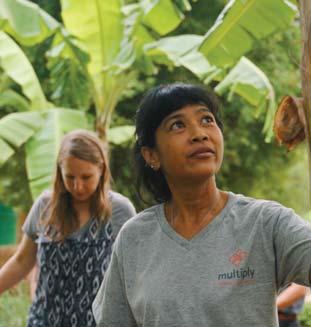

Ridgepoint women open coffeehouse to be a space of warmth, inspiration
BrentWarkentin calls it a “wonderful, crazy idea.” After all, how often does a Bible study lead to opening a coffeehouse?
But that’s what happened at Ridgepoint Church in Wichita, Kan., when a group of women began dreaming.
Warkentin, lead pastor at Ridgepoint, likened it to past church risks, including launching a building campaign in 2020 at the start of the pandemic and a worship center expansion project in 2008 during the housing crisis.
“Sometimes I’ve equated it to when Moses led (the Israelites) across the Red Sea,” he says. “He stood on dry ground and held out his staff, and it parted and he walked through. Forty years later, Joshua led them into the promised land, and they had to step into the
water before it parted. There was an elevated element of faith.”
Before running with the coffeehouse idea, Warkentin talked to part-time business manager Geoff Graves.
“Geoff, who is a ‘Yes’ guy, said, ‘Brent, let’s just give them six months and see if this thing fizzles out,” Warkentin says. “It wasn’t out of skepticism. Most new ideas fizzle out.”
“It was to prove our tenacity,” says Joan, Warkentin’s wife and a member of the study.
The existence of Aroma Coffeehouse, a ministry of Ridgepoint that seeks to be an inviting space for the community, is a testament to pursuing big dreams.
“We’re proud of this group,” Brent Warkentin says. “The Lord rewards risk.”
The dreaming began when women gathered to study Mark Batterson’s In a Pit with a Lion on a Snowy Day in Summer 2020.
“The book is about chasing your dreams,” says study member Bonnie Schroeder. “I said, ‘I know some of you girls have dreams.’”
As the women talked, they recognized dreams that could overlap in a coffeehouse. Mary Ellen Soden wanted to open a coffeehouse. Schroeder, a former preschool director, wanted to start a children’s storytime. Lori Herrington, a later addition who chairs the Aroma board, needed a meeting space for the young adult group she leads with her husband.
Each woman brought different skills to the table.
Some of the women behind the dream and members of Aroma’s Board of Directors are (from left): Debbie Grimes, Debbie Allison, Lori Herrington, Joan Warkentin, Bonnie Schroeder, Carol Sweat and Tammy Ratzlaff.
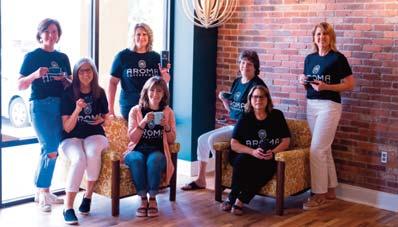
“I have so learned to appreciate every different personality, every different gift because you can so see why God put us together,” Joan Warkentin says.
The women took their idea to Graves, who tabled the discussion.
“I wanted to see if they really were going to come back in six months, to see if they still had the same fire in their belly and passion about it,” Graves says. “And they did.”
The women used those months to visit coffee shops and take notes.
“There were three of us in (Geoff’s) office in the fall of ‘20, and when we came back in ‘21, there were probably 15 ladies sitting there,” Schroeder says.
With Graves’ help, the women developed a business plan and began fundraising.
The project received $35,000 from Ridgepoint’s annual “Big Offering,” when the church gives 100 percent of one Sunday offering to ministries outside its budget.
Members of the congregation provided expertise. Someone in real estate development offered the first six months’ rent free—and a reasonable rate after that—for a former hair salon. The women’s husbands helped with demolition. A contractor donated time and materials. A painter donated services.
The women transformed the space resourcefully, utilizing lobby furniture from Chick-Fil-A, doors for tabletops and comfortable chairs free from the curb. The biggest purchase was equipment, including an espresso machine from Italy, and study member Carol Sweat found a local company to help purchase, set up and maintain it.
Aroma opened June 13, featuring an open seating area, “introvert

nook” and enclosed meeting room available to reserve during the day or rent after hours for events.
Aroma is a nonprofit LLC, and Ridgepoint is the single member. The name comes from a coffee tasting, and one wall features 2 Corinthians 2:15. With beans from a local artisan roaster, Aroma offers coffee and non-coffee drinks, baked goods and other food items.
As a nod to Ridgepoint’s Mennonite heritage, Aroma serves a peppernut with each drink. A description of these “tiny, big-flavored cookies” hangs on a wall alongside a photo collage of former church buildings.
Aroma sells merchandise benefitting Beauty for Ashes, which serves women rescued from traffiking in Nepal, and Naomi House, a Multiply small business center serving refugee women in Thailand.
Weekly events include live music on Friday nights, a young adults
on Tuesday and a Thursday storytime, including a Bible story, hosted by Schroeder with two helpers to assist with crafts and snacks.
Graves works with the women weekly on financials and consulting.
“I always try to keep my ear to the ground to listen to what the customers and people are telling me,” Graves says. “I ask for the truth, and everyone seems to really enjoy it.”
Brent Warkentin calls Aroma a “backdoor entrance” to Ridgepoint.
“We want it to be comfortable, not overkill, with the Christian witness,” he says. “We’ll probably not know most of the fruit that comes out of this, and we’re okay with that.
The mission statement (is), ‘To be a space of warmth and inspiration that serves excellent coffee, invites kind connections and motivates people to love and serve our community.’”
Janae Rempel
New seminary dean says FPU is a “good fit”
Thestories of courageous and faith-filled women in her ancestry motivate and inspire Sharon Tan, the recently appointed vice president and dean of Fresno Pacific Biblical Seminary.
On her mother’s side, the story of faith goes back three generations to her great grandparents living in a village in China. They came to know Christ through missionaries from the West. Driven out of their village because of their faith, the family eventually settled in Malaysia.
Tan’s grandmother, who became a math teacher, was a faithful and active church member known for her generous spirit. Tan’s mother, a physician, took the Christian faith full circle, returning to their homeland of China on short-term missions.
On her father’s side, Tan’s grandmother came from China to Malaysia as a bride at age 16 and gave birth to Tan’s father at 17. The young mother came to know about Jesus. Hungry for the Word, she would sneak out to attend church and eventually taught herself to read so she could read her Bible.
Her grandmother’s love for reading Scripture emerged early in Tan’s own life. Her aunt taught Tan to read and gifted her with a Living Bible. She was just 8 years old when she
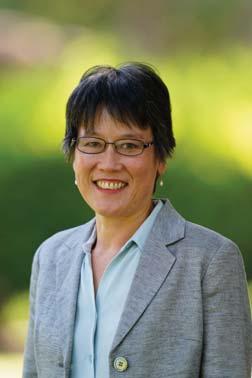
read it cover to cover.
“I just got caught up in the stories,” Tan recalls.
Tan describes herself as a “Jesusfollower.” Following Jesus has taken
her on a path through several Christian faith traditions. In addition to the strong influence of her “very devout” Baptist aunt, her childhood faith was shaped by her own parents who raised their four children at the Methodist church next door to their home.
In 1978 Tan’s family made a visit to Singapore to attend a Billy Graham crusade. Relatives in Singapore who had become charismatic Christians guided the family’s faith in a new direction.
“We sort of dove into it,” reflects Tan, “and moved into independent charismatic-type churches.”
For a charismatic, Oral Roberts University was the natural choice when Tan decided to study in the United States. She earned her bachelor’s degree in business administration and Bible. When she moved on to law school, she was delighted to find Emory University in Atlanta, Ga., where she could pursue her practical career path in law while also earning a master’s degree in theological studies.
Four years of working for a law firm in Atlanta convinced Tan that practicing law was not what she really wanted to do.
“I thought about teaching in law school,” she recalls, “but eventually decided to explore the other side of me that was theologically curious.”
After a summer at Youth with a Mission’s discipleship training school in Montana, Tan headed back to Emery University to earn her doctorate in ethics.
In 2004, the offer of a job as professor of Christian ethics at United Theological Seminary in St. Paul, Minn., took her into very new territory.
“The only job offer I had was a seminary in a place I had never heard of before,” she says. “It felt like the ends of the earth from the equatorial climate of Malaysia. I remember shoveling snow and wondering what I was doing there.”
Even so, Tan could see the hand of God at work in the move. She felt she was experiencing the kind of direction that the early church felt when they were forced to move out from Jerusalem.
“Layered onto the way we move because of economics is God sending us,” she says.
Eventually serving as dean at United Theological Seminary and later at Eden Theological Seminary, Tan honed her skills in administration. She also tapped into her own diverse background to draw out the unique gifts and theological perspectives offered by faculty from communities of color.
“I think of diversity as God’s creation, a way he gives us gifts,” she says.
Amid the variety of church traditions and cultural expressions of
Christian faith that have shaped her, Tan has found a strong foundation in a personal walk and connection with God. In recent years this has taken shape with a Bible meditation and prayer group where members commit to an hour in prayer each day. She has found the practice transformative.
“Before I was afraid of a God who was looking for ways you’re doing it wrong,” she says. “Now I have come to see God as a God of love, not someone who just wants you to toe the line.”
Just as a heritage of stories demonstrated her forbears’ openness to God’s spirit and direction, Tan’s story is one of a woman continuing to pursue a “theological curiosity.” She is intrigued by the seminary’s blend of evangelical and Anabaptist roots.
“Alongside my evangelical beliefs, I was drawn to Anabaptism,” she says. “Academically I’ve been interested in reconciliation and social ministry and Anabaptism feels comfortable to me. It’s a good fit.”
Kathy Heinrichs Wiest




















Compiled by Janae Rempel
Baptism/Memberships
Cristian Keizer, Peyton Nelson, Alexis Nelson and Greta Gorbenko were baptized at South Mountain Community Church, Draper (Utah) Campus,Dec. 4. Mark Whitley and Jamie Payne were baptized Oct. 9.
Bryce Beery and Noelle Riesenberg were baptized at Stony Brook Church, Omaha, Neb., Dec. 4.
Dwight Reynolds and Denise Dantzler were received as members at Heritage Bible Church, Bakersfield, Calif., Nov. 20.
Bentley Regier, Lakin Rector, Ethan Rempel, Lincoln Wichert and Trudy Hein were baptized and received as members at Hillsboro (Kan.) MB Church, Nov. 13. Blake Beye was also received as a member.
Five people were baptized at Greenhouse Community Church, Saratoga Springs, Utah.
Ryan Sproul, Kristi Sproul, Jenna Parker, Aubrey Cook, Jami Cook, Carissa Boehs, Mark Winans, Wendy Winans, Josiah Winans, Emilia Winans, Micah Winans and Elijah Winans were received as members at Fairview (Okla.) MB Church, Oct. 30.
Dalton Dennison and Julia Coates were baptized at Lakeview Church, Grantsville (Utah) Campus, Oct. 23.
Roy Henry and Amy Henry were received as members at Martin Box MB Church, Marshall, Ark., Oct. 16.
One person was baptized at Hesston (Kan.) MB Church Oct. 16.
Seven people were received as members at Rosedale Bible Church, Bakersfield, Calif., Oct. 16.
Rachel Mellor was baptized at South Mountain Community Church, St. George (Utah) Campus, Oct. 9. Monica Wright was baptized Oct. 2. Bailey Mizukawa was baptized Sept. 25.
Dan Krause concluded his service as lead pastor at Rosedale Bible Church, Bakersfield, Calif., Aug. 31. He and his wife, Colette, were honored at a Sept. 10 banquet.
David Brown concluded his service as youth minister at Lakeview Church, Grantsville (Utah) Campus, and Kaitlen Brown concluded her service as children’s director. Jessica Barber began serving as children’s director, Cessna Hubrich as worship director and Matt Peterson as youth minister.
Andrew Wuerffel was installed as lead pastor at Zoar MB Church, Inman, Kan., Nov. 6. Al and Cheryl Magnuson concluded their service as interim pastoral couple.
Dustin Dick concluded his service as youth pastor at Buhler (Kan.) MB Church, Oct. 30. Bill Franklin began serving in that role as interim.
Susan Evans concluded her service as family pastor at Cornerstone Community Church, Topeka, Kan., Oct. 24.
The Lighthouse Church, Lakewood (Colo.) Campus has closed.
Anderson, Donald E., Fresno, Calif., of Mountain View Community Church, Fresno, Feb. 24, 1940—May 26, 2022. Parents: Ellswood and Ruth (Johnson) Anderson. Spouse: Marilyn Louise Victory (deceased); Beth Anderson. Children: Heather Smith, Jarrett, Todd; seven grandchildren,
one great-grandchild. Step-children: Phil Ogden, Doug Ogden; five step-grandchildren.
Claassen, Dwayne Herbert, Hillsboro, Kan., member of Hillsboro MB Church, Aug. 22, 1943—Nov. 16, 2022. Parents: Herbert and Anna Claassen. Spouse: Diane Janzen. Children: Larry (deceased), Russell, Lori Quicke; four grandchildren.
Friesen, David “Dave” Wayne, Charlotte, N.C., member of North Fresno (Calif.) Church, Jan. 13, 1953—Oct. 13, 2022. Parents: Alfred W. and Dolores (Ewert) Friesen. Spouse: Deborah Dick. Children: David Michael, Matthew W., Emilie Spillman.
Friesen, Margaret, Reedley, Calif., member of Reedley MB Church, Jan. 26, 1933—Oct. 19, 2022. Parents: H.P. and Anna (Fast) Isaak. Spouse: George Friesen (deceased). Children: Steven Unruh, Coleen Rutledge, Shirley Voth, Cindy Unruh; three grandchildren, four great-grandchildren. Step-child: Donna Herrmann.
Funk, Shirley A., Shafter, Calif., member of Shafter MB Church, Feb. 19, 1939—Nov. 10, 2022. Parents: Martin and Katherine (Rempel) Classen. Spouse: Larry Funk (deceased). Children: Kendall, Cheryl Miller; four grandchildren, two great-grandchildren.
Gossen, Viola Faye, Hillsboro, Kan., member of Hillsboro MB Church, March 11, 1924—Aug. 15, 2022. Parents: Peter C. and Margaret Dyck Gossen.
Henneberg, Ronald “Bill” William, Wichita, Kan., member of Ridgepoint Church, Wichita, April 30, 1947—Oct. 3, 2022. Parents: Oren William Daily “Bill” and Marjorie Henneberg. Spouse: Donna Kirklen. Children: Ryan, Jason; seven grandchildren.
Janzen, Marlin, Hillsboro, Kan., member of Hillsboro MB Church, June 1, 1939—Oct. 21, 2022.
Parents: John and Anna (Wiens) Janzen. Spouse: LuElla Nachtigall. Children: Mark, Maura Wiebe; four grandchildren, one greatgrandchild.
Meave, Maria, Reedley, Calif., member of Reedley MB Church, Feb. 12, 1936—Sept. 16, 2022. Parents: Timoteo and Soledad (Guzman) Gomez. Spouse: Antonio Meave (deceased). Children: Thelma Buckley, Velma MeaveSmith, Alfonso Archuleta Jr., Norma Archuleta; nine grandchildren, nine great-grandchildren.
Nightengale, Melba “Jean,” Cordell, Okla., member of Bible MB Church, Cordell, March 3, 1938—Aug. 25, 2022. Parents: Harvey and Malinda (Wedel) Brown. Spouse: Larry Nightengale. Children: Kevin, Lisa Willard; four grandchildren, two great-grandchildren.
Pollman, Shirley Jane, Bridgewater, S.D., member of Salem MB Church, rural Bridgewater, Sept. 23, 1936—Sept. 30, 2022. Parents: Elias J. and Justina (Walter) Hofer. Spouse: Sam Pollman Jr. (deceased). Children: Jeffrey, Linda Claggett, Cynthia Fisher, Kristi Wollmann; 11 grandchildren, 16 great-grandchildren.
Reimer, Fern L., Buhler, Kan., member of Buhler MB Church, March 1, 1928—Oct. 11, 2022. Parents: Pete and Justina (Dick) Esau. Spouse: Marvin Reimer (deceased). Children: Bruce, Jane Jost; three grandchildren, nine great-grandchildren.
Robb, Gerald “Jerry” Alan, Fresno, Calif., member of Butler Church, Fresno, Oct. 29, 1942— Oct. 30, 2022. Parents: Roy and Clara Robb. Children: Jason, Brad; four grandchildren.
Thiessen, Hildegard Agnes, Wichita, Kan., member of Ridgepoint Church, Wichita, Nov. 13, 1928—Nov. 12, 2022. Parents: Leonard and Agatha Krieger. Spouse: Wilmer Thiessen (deceased). Children: Charlene, Lynette Roth, Shaun, Vonda
Kinser; seven grandchildren, four great-grandchildren.
Warkentin, Ruby, Fresno, Calif., member of Reedley MB Church, Dec. 1, 1925—Sept. 24, 2022. Parents: Jacob and Lizzie (Siemens) Nikkel. Spouse: Ervin Wiebe (deceased), Leo Warkentin (deceased). Children: Beverly Christman; four grandchildren, eight great-grandchildren, 10 great-great-grandchildren, one great-great-great-grandchild.
Weaver, Peninnah Leppke, Bakersfield, Calif., member of Rosedale Bible Church, Bakersfield, Sept. 30, 1928—Sept. 15, 2022. Parents: Daniel and Anna Kliewer. Spouse: Marvin Leppke (deceased), Vernon Weaver (deceased). Children: Marvis Meyer, Brenda Hyatt, Annette Charles; 12 grandchildren, 14 great-grandchildren.
Wollman, Harvey, Huron, S.D., member of the former Ebenezer MB Church, Doland, S.D., May 14, 1935—Oct. 18, 2022. Parents: Edwin and Katherine (Kleinsasser) Wollman. Spouse: Anne Geigel. Children: Kristine, Michael, Daniel; seven grandchildren.
Zortman, Herbert Carey “Cay,” Wichita, Kan., member of Ridgepoint Church, Wichita, July 1, 1941—Oct. 15, 2022. Parents: Herbert and Gladys (Newell) Zortman. Spouse: Shirley (Isaac) Wheeler. Children: Elaine Kohler, Anita, Stan; seven grandchildren, two great-grandchildren. Step-children: Max Wheeler, Margo Shelton; six step-grandchildren.
House of the Gospel, Fresno, Calif., hosted a Christmas Eve Fair Dec. 24 with food, live animals, photos, crafts and activities. The congregation held a father and son archery competition Dec. 17.
North Oak Community Church, Hays, Kan., hosted a night of fellowship, carols, food and a talent show, Dec. 18.
Pine Acres Church, Weatherford, Okla., hosted a family Christmas night with crafts and activities Dec. 18. The congregation hosted a “Stronger Marriage Workshop” with Trey and Lea Morgan Dec. 2-3.
Axiom Church, Peoria, Ariz., held a “Movie in the Yard” Dec. 18 with hot cocoa and a food truck. The congregation hosted a contemplative liturgy experience of art, music, prayer and story Nov. 27 to kick off Advent.
Neighborhood Church, Visalia, Calif., offered free photos with Santa and Mrs. Claus as well as live carols and worship Dec. 18.
The women’s ministry at Salem MB Church, Bridgewater, S.D., held a Christmas tea party Dec. 15.
Cornerstone Community Church, Topeka, Kan., hosted a Christmas party Dec. 14, decorating gingerbread houses and enjoying a hot cocoa bar and dessert. The congregation held a Thanksgiving meal following the Nov. 20 service.
Women from Corn (Okla.) MB Church gathered for a Christmas “Mystery Home Tour” and refreshments, Dec. 11. Each woman was invited to bring toiletries for Corn Heritage Village.
Women from Zoar MB Church, Inman, Kan., gathered for a cookie exchange and caroling Dec. 11.
Women from Hillsboro (Kan.) MB Church gathered Nov. 6 to craft ornaments for an Alternative Gift Market.
Women from Stony Brook Church, Omaha, Neb., could bring their children to “Sips and
Slides” on Friday mornings to share hot drinks and allow children to play together.
Faith Bible Church, Omaha, Neb., women gathered for a Christmas brunch and ornament exchange Dec. 10.
Mountain View Church, Fresno, Calif., family worship nights Nov. 27 and Oct. 23 that included dance and art stations for kids.
House of the Gospel, Fresno, Calif., hosted a Slavic musical evening Nov. 20.
Butler Church, Fresno, Calif., celebrated its 65th birthday, Sept. 25 with a “Butler’s best” potluck with multicultural dishes from each of its congregations. Others shared music and dance. An evening program focused on Hebrews 10:23-25.
Country Bible Church, Orland, Calif., celebrated its 100th anniversary Sept. 3-5. The weekend celebration included times for sharing and fellowship, Sunday morning worship service and a day at Black Butte Lake.
Butterfield (Minn.) Community Bible Church celebrated its centennial Sept. 18. Speakers included USMB national director Don Morris, CDC minister Daniel Rodriguez and former pastor David Loewen. The service concluded with two new members joining the church.
Ebenfeld MB Church, Hillsboro, Kan., hosted a live nativity Dec. 17-18. The congregation filled 61 Thanksgiving Baskets for local residents.
Bethany Church, Fresno, Calif., hosted its live nativity, “Journey to Bethlehem,” Dec. 16-18.
Neighborhood Church, Visalia, Calif., hosted its annual Christmas Store Dec. 17 to partner with low-income parents to provide gifts for their children at 90 percent off retail. More than 20 people helped coach and referee 85 kids participating in a soccer league.
Kingwood Bible Church, Salem, Ore., went Christmas caroling to the surrounding neighborhood Dec. 17.
Hesston (Kan.) MB Church went caroling to visit senior adults Dec. 14. The congregation held its second “Reaching Out Night” Nov. 9 with a meal, speaker and Ultimate Bingo with prizes.
Shafter (Calif.) MB Church shared Christmas carols at Carrington during the dinner hour Dec. 13. The church outreach committee participated in the Shafter Recreation Department’s “Thankful Thursday” meal program Nov. 17.
The Bridge Bible Church, Bakersfield, Calif., hosted “Merry Christmas Bakersfield” Dec. 9 with interactive craft rooms, face painting, food trucks and more. The congregation was invited to partner with Bakersfield Angels in a series of generosity opportunities benefiting families and individuals experiencing foster care.
Butler Church, Fresno, Calif., distributed holiday food bags to about 100 families the Monday before Thanksgiving.
Women from North Oak Community Church, Hays, Kan., delivered cookies and sang carols for members of the North Oak congregation. The congregation hosted a “Life in Limbo” interactive workshop Nov. 7 with CarePortal to inform people about the foster care system.
The Family Ministry Team at Cornerstone Community Church, Topeka, Kan., hosted a parents’ night out community outreach Dec. 10.
Faith Bible Church, Omaha, Neb., served 130 people at its annual Thanksgiving meal Nov. 20.
Shafter (Calif.) MB Church hosted its annual invitational takedown wrestling tournament Nov. 19 with 160 competitors, its largest attendance yet. The local Fellowship of Christian Athletes representative handed out New Testaments and studies of John.
Copper Hills Church, Peoria, Ariz., hosted its 4 Peak Challenge Nov. 19.
Axiom Church, Peoria, Ariz., hosted a Thanksgiving neighborhood feast Nov. 16. On the second Saturday of the month from October to April beginning Oct. 8, the congregation hosted a vintage and makers market, live music, live mural painting and art, food and coffee as part of Peoria’s 2nd Saturdays. Some members of the congregation served the Arizona Association for Foster and Adoptive Parents by helping assemble bicycles for children.
Lead Pastor: Bethany MB Church, Fresno, Calif., is seeking a man who has a dynamic relationship with Jesus and a proven pattern of Spirit-led, theologically sound, Bible-based teaching and preaching. The lead pastor will champion the mission, vision and values of Bethany Church and must be an effective communicator who is both relational and relatable, skilled at empowering members to serve in roles of leadership within the body of Christ and committed to the power of prayer. To learn more, visit https://www.bethanychurchfresno.com/Pa storal-Search
Youth Pastor/Campus Pastor: Heritage Bible Church, Bakersfield, Calif., is seeking a full-time youth pastor/campus pastor. The church began Readyland Preschool in 1967,
From Testimony, page 17
Mountain View Church Sunnyside Campus, Fresno, Calif., hosted a Thanksgiving sports camp Nov. 22. The congregation hosted a Thanksgiving meal Nov. 13.
Thirty-nine people from Zoar MB Church, Inman, Kan., served at the Operation Christmas Child processing center in Dallas. The congregation collected 222 shoeboxes. Parkview MB Church, Hillsboro, Kan., collected 156 shoeboxes, North Oak
and today there are 300+ students, preschool through 8th grade, on the church campus each day. Primary responsibilities include: directing junior high and high school ministries, training volunteer leaders and organizing camps and mission trips. This person will also serve the school as a campus pastor, assisting in chapels and being available to teachers, classes and students for spiritual guidance. For a full job description, contact www.heritagebible.us.
Pastor of Student Ministries: Shafter (Calif.) MB Church is searching for a full-time pastor of student ministries to oversee junior high, high school and college ministries. Shafter is a community of approximately 20,000 located in the southern San Joaquin Valley of California, 10 miles northwest of Bakersfield. A full
speaking less—even witnessing less—was what I needed to do to get along.
A few years ago, my sisters traveled from India to visit me. Despite our joyous reunion, I felt humbled by their observation. They told me I had lost my zeal and my confidence. I was stifled. I was cautious. I had forgotten that the King of Heaven is my hmachhuan
But God’s fire never dies. It simply smolders until the Spirit fans the flame into a blaze. I began to pray for
Community Church, Hays, Kan., collected 928 and Hillsboro (Kan.) MB Church collected 432 shoeboxes.
Ridgepoint Church, Wichita, Kan., received $147,441 for the church’s Big Offering benefitting its south campus, CarePortal and Naomi House in Thailand.
North Fresno (Calif.) Church collected 36 relief kits for MCC.
Twelve youth and three adults from Bethesda Church, Huron, S.D., did hurricane relief work and provided vacation Bible school in St. Charles, La.
job description and additional information is available at https:// www.shaftermb.org/psm/
Worship Director: Good News Fellowship, Ferndale, Wash., is seeking a part-time worship director to lead the church body in musically celebrating God. The worship director provides leadership by creating an inviting, worshipful atmosphere, a space in which people can meet with God; leading the congregation and the members of the worship ministry in growing their relationship with the Lord through worship; and developing a rotating team of worship leaders. More information: https://www.goodnewsfellowship.org/worshipdirector. Interested applicants: send cover letter, résumé to office@goodnewsfellowship.org.
open doors, which God continues to open in abundance—at work, in my neighborhood and in the community. Witnessing can often be difficult in our American context. Like many of you, I must honor the regulations and restrictions of my secular workplace. But God is still my hmachhuan. He provides the opportunities and simply asks that I boldly trust him when those opportunities appear. By his grace, he is once again setting my heart ablaze.
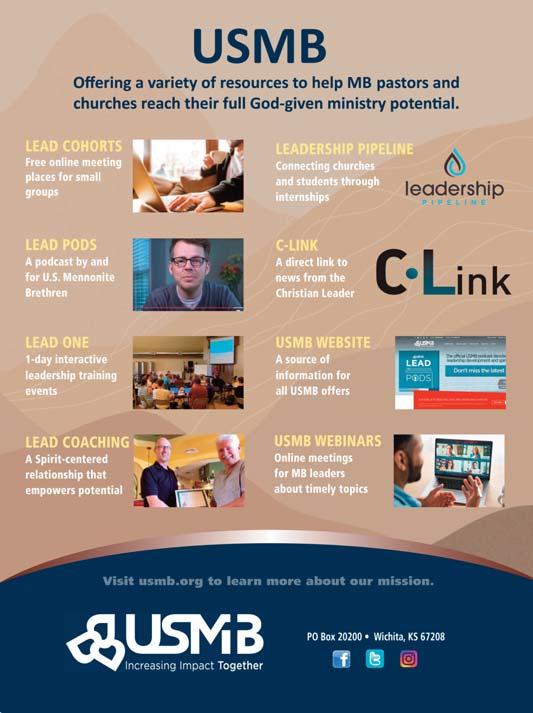







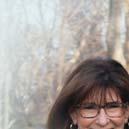
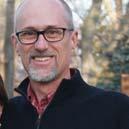
Bring your faith into the process with Biblical guidance
Receive free assistance from experienced advisors
fr R pr y om experienced advisors ee assistance e fr Receiv ocess aith into the our f
pr E

Establish a plan that provides for your family Fuel






